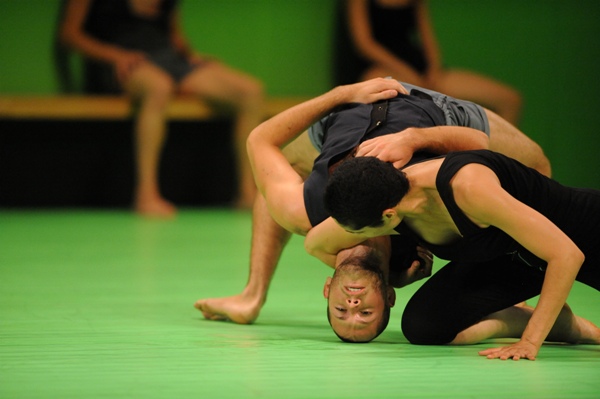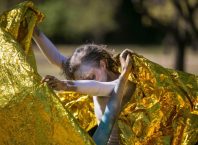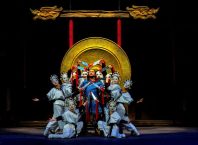
Home can be the least familiar place at times, stranger than an alien planet and replete with surprising encounters, unexpected because we believe that we already know where we are and what we can expect. The experienced galactic traveler, having traversed the dance universe several times over, arrives at Ohad Naharin’s “HORA”, expectations firmly in place. The curtain lifts, the cables are cut and the audience falls into an ever-widening space of possibilities.
Master trickster of repetition and subtle deviation, expert at transforming the familiar into something new and strange, Naharin has found a suitable partner in Isao Tomita, whose synthesized arrangements of classical works compose most of the soundtrack. In presenting “HORA”, Naharin said “Sometimes I prefer his [Tomita’s] music to the original.” Aware of the historic resonance for dance audiences of works such as Debussy’s Prélude à l’après-midi d’un faune, Naharin offers, “Its music that my mother played for me when I was growing up…for me it connects to nostalgia that is connected to my roots.”
It is tempting to see an a reference to these roots in the choice of name, “HORA” can be understood as referring to the Israeli folk dance, relating to ethnic dance and national roots. Naharin does not deny the possibility of reference, yet precludes any simple inference from it, saying: “We [those assembled in the Suzanne Dellal Theatre] know what hora is, if we walk out onto the street slowly, slowly the number of people who know what “hora” is will grow smaller. I like the phonetics of it. For some of us it is a dance.” Defining at once a circle of those in the know, in the now, those familiar with the traditional circle dance of the hora, and at the same time, sending the mind out on different tangents, within widening circles that touch on other possibilities, he adds, “There is a by-product that I like – in Spanish it means “hours,” there are a few other interpretations in other languages. There are several points of reference in the work. It creates an experience not necessarily from one perspective. To know that there is something more in the moment, not in the reference. But in this new fresh thing itself.”
“HORA” is a work for 11 dancers, all of whom occupy the stage throughout the evening. There is a density and intensity of movement in the work which is intimately connected to Naharin’s movement language of “Gaga,” and his dialogue with the dancers. One element of Gaga speaks of “being available” to move in every given moment, even when one is not moving. This concept internalized in the body is very much present in “Hora,” with its dynamic range from an inexorable slowness to explosive, expansive movement.
Naharin worked with the dancers first individually, creating separate choreographic segments attuned to each dancer, then as a group, engaging with them in a creative dialogic process.
While some view the abstraction of the choreography as creating distance, within that distance the mind finds the freedom to discover private connections to the work that open into an infinite realm of associations, creating a continuous flow of images, emotions and concepts in unending transformation between the private and universal. It simply works. When seeing “HORA” for the first time, there was one segment performed to a certain score that instigated a particular musical premonition in me, which was happily fulfilled later in the work. The illusion of a private association was immediately dispelled by a friend and colleague who confessed her “prophetic soul” to me after seeing the work. What I had interpreted as a very personal association, dependent on my generational affiliation, geographic predisposition and pop-cultural affections, turned out to have a far more general reach.
Skeptical readers, I urge you to participate in my informal survey – what musical premonition does “HORA” generate? Alternatively, you can just watch and enjoy.
Performances:
January 19 & 20 at 21:00, January 21 at 14:00, January 22 at 22:00
Suzanne Dellal Centre for Dance and Theatre
Tickets: 03-5104037






Comments are closed.